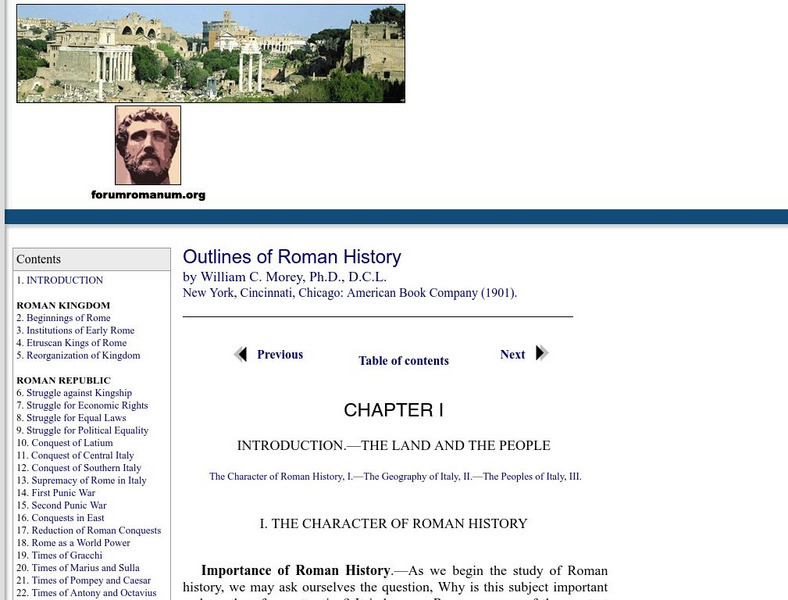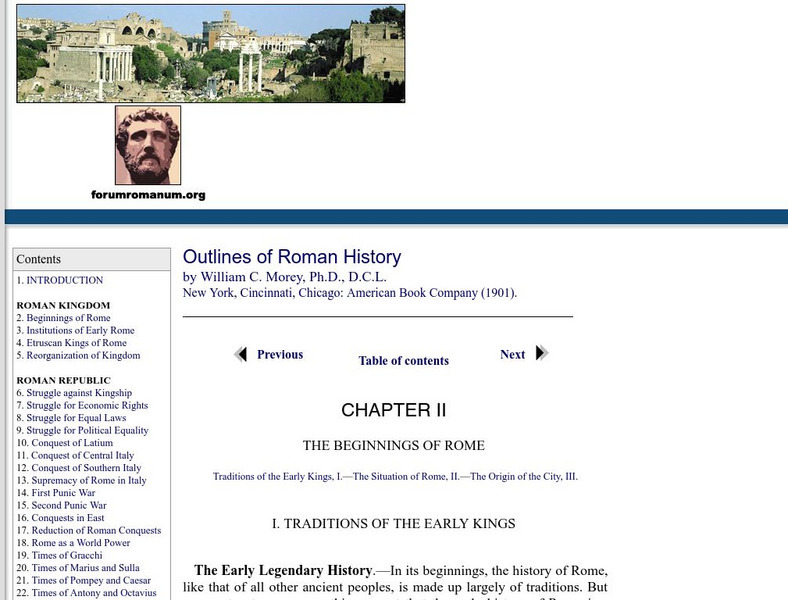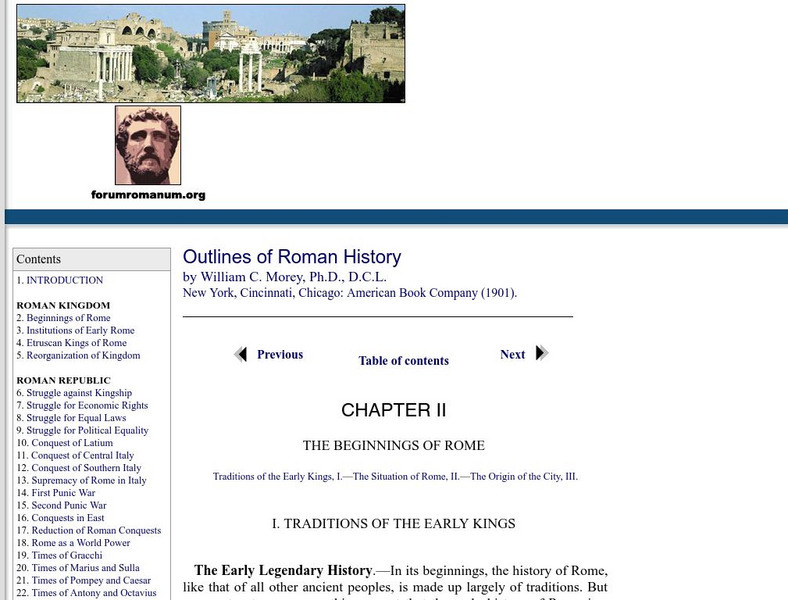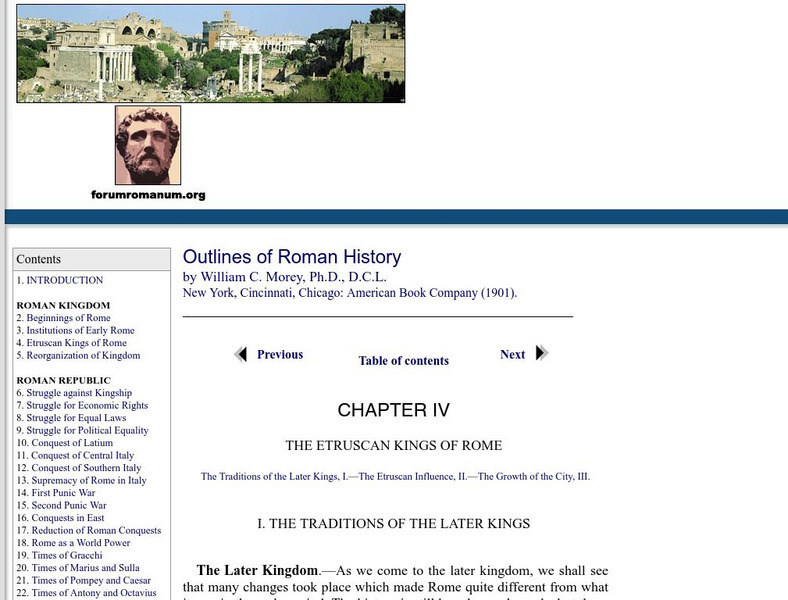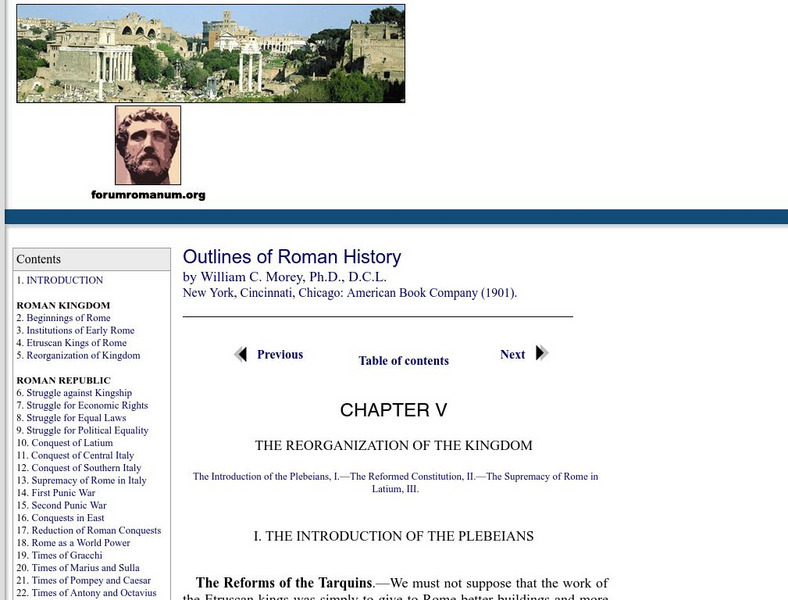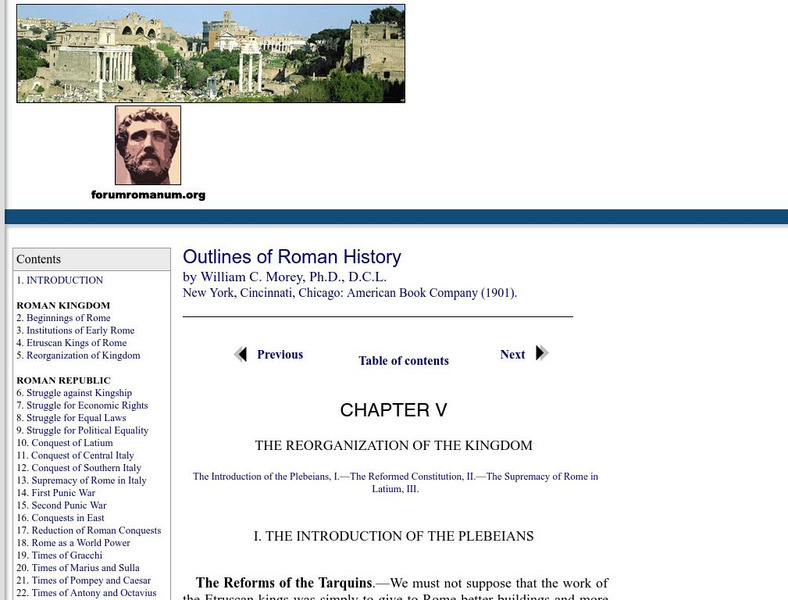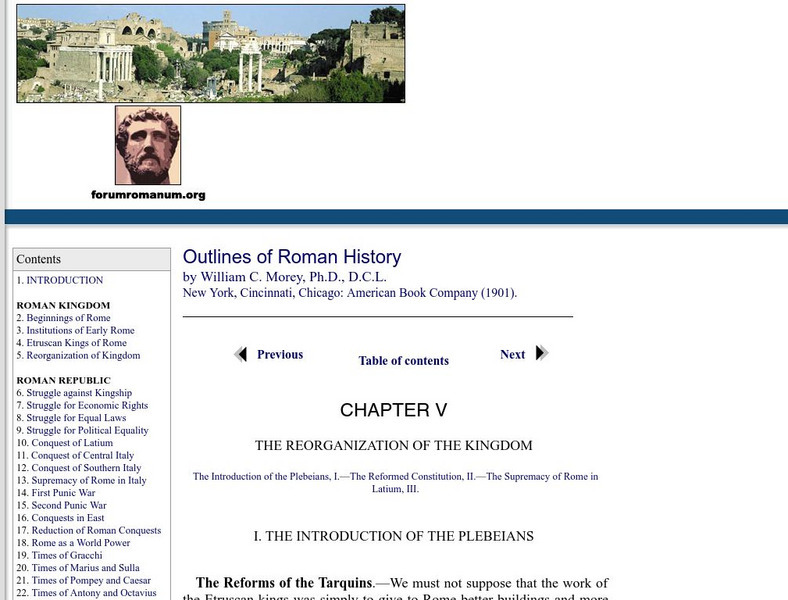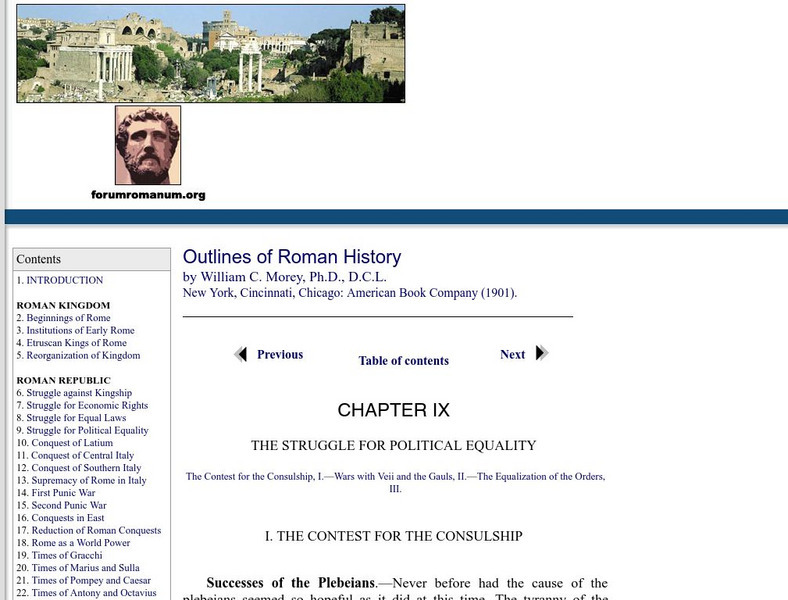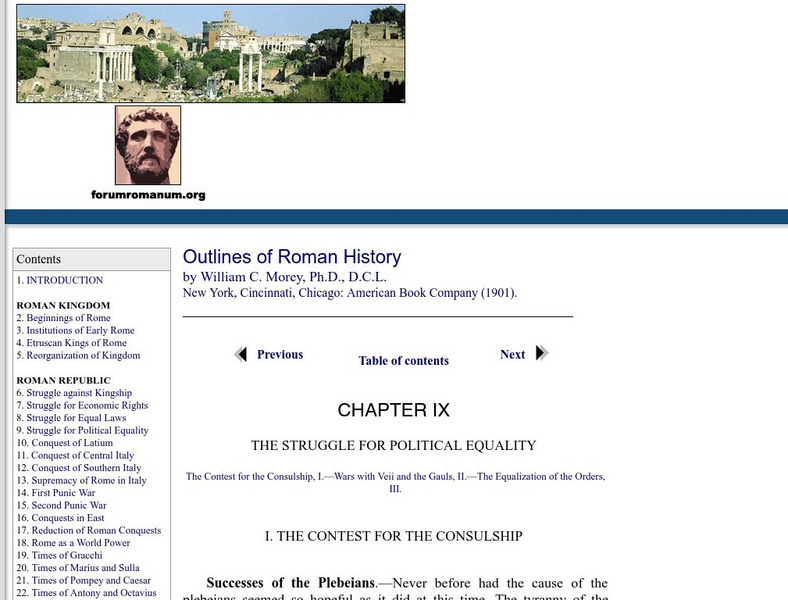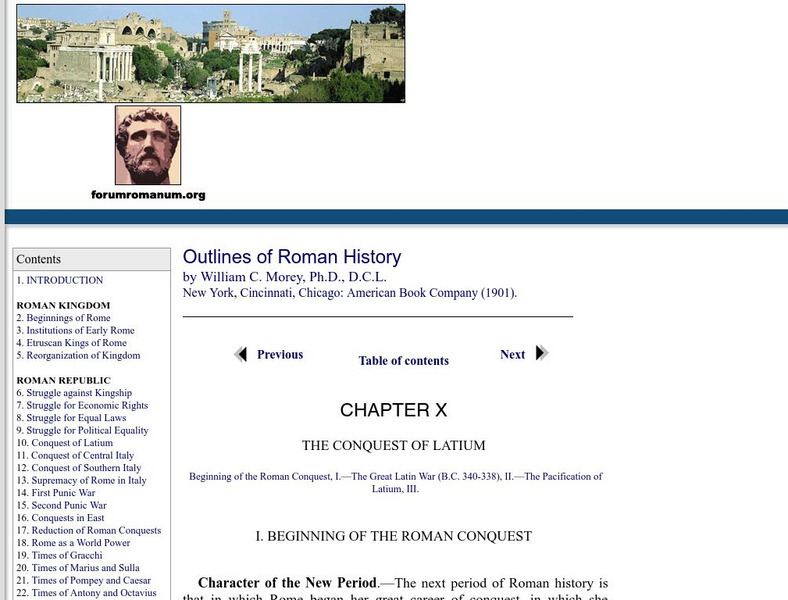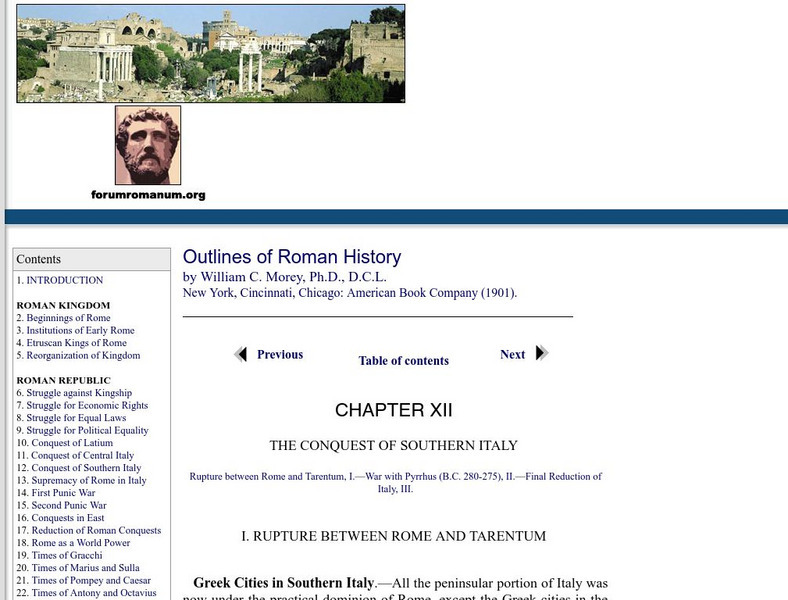Forum Romanum
Outlines of Roman History: Julian Emperors: Reign of Nero
Find out about the infamous Nero, the burning of Rome, and his persecution of the Christians in this passage from William Morey's 1901 textbook.
Forum Romanum
Outlines of Roman History: Introduction the Land and the People
This is the introductory chapter of Morey's 1901 textbook on Roman History. It sets out the geography of Italy and the Italic tribes who lived there. The text is old, but surprisingly easy to read and packs in a lot of information.
Forum Romanum
Outlines of Roman History: Beginnings of Rome: Traditions of the Early Kings
This chapter in William Morey's textbook on Roman history describes the legendary founding of Rome and the reign of the early kings.
Forum Romanum
Outlines of Roman History: Beginnings of Rome: The Situation of Rome
The seven hills of Rome are shown on two maps, showing the hills and their relation to neighboring lands on the Italian peninsula. There is a brief discussion on the geographic importance of the hills.
Forum Romanum
Outlines of Roman History: Beginnings of Rome: The Origin of the City
This article lays out the probable founding of the city of Rome, rather than the legendary one. Three tribes, occupying three different hills, make an alliance and unite as one city-state, eventually becoming the city of Rome.
Forum Romanum
Outlines of Roman History: Institutions of Early Rome: The Early Roman Society
The importance of family in Roman culture was apparent from the beginning of Rome. This article explains the structure of Roman society from the basic family unit to the tribe, a coalition of many families.
Forum Romanum
Outlines of Roman History: Institutions of Early Rome: The Early Roman Religion
Early Roman religion was based on the family with a strong "head of the family" in Jupiter. Because the early Romans were an agricultural society, much of the religion also centered on nature.
Forum Romanum
Outlines of Roman History: Institutions of Early Rome: The Early Roman Government
This article explains how early government of the Roman city-state evolved. The foundation of the government under the Roman Republic was established during the Roman monarchy.
Forum Romanum
Outlines of Roman History: Etruscan Kings of Rome: Etruscan Influence
The Etruscans influenced not only the government of the Roman monarchy, but also the religious practices, and early architecture.
Forum Romanum
Outlines of Roman History: Etruscan Kings of Rome: Traditions of the Later Kings
This article gives a description of the important later Etruscan kings. The history is still based on legend, but the influence of the Etruscan people can be seen in the development of Rome.
Forum Romanum
Outlines of Roman History: Reorganization of the Kingdom
This chapter in William Morey's 1901 textbook discusses the roforms made by the Etruscan kings and the introduction of the tension between Roman patricians and plebeians.
Forum Romanum
Outlines of Roman History: Reformed Constitution
A description of organization of the Roman army, set up in the 6th century BC, by the Etruscan king, Servius Tullius. This was the basis of the army through the Republic.
Forum Romanum
Outlines of Roman History: Supremacy of Rome in Latium
By the end of the Roman monarchy, Rome had incorporated many cities into the Latin League, a military alliance. This was the beginning of Roman expansion into all of Italy.
Forum Romanum
Outlines of Roman History: Struggle Against the Kingship
The Romans cast off their Etruscan kings and create a new Republic, incorporating many of the governmental ideas from the Etruscans into their new government.
Forum Romanum
Outlines of Roman History: Grievances of the Plebs
William Morey explains the tension between the Roman aristocracy, the patricians, and the plebeians with the establishment of the Republic. The First Secession of the plebeians brings some relief.
Forum Romanum
Outlines of Roman History: Struggle for Equal Laws
The Laws of the Twelve Tables were written down as a result of the continuing conflict between patricians and plebeians. Now laws were not secret and applied to all, regardless of class.
Forum Romanum
Outlines of Roman History: Second Secession and Its Results
Read about how the patricians finally understand the importance of the plebeians, who are then granted the right to pass laws for all and to intermarry with patricians.
Forum Romanum
Outlines of Roman History: The Contest for the Consulship
The Roman Republic continues to evolve, incorporating plebeians into the government. New offices are added to the government in an attempt to keep both the patricians and plebeians satisfied.
Forum Romanum
Outlines of Roman History: Wars With Veii and Gauls
In this article you read how the Romans begin to reclaim and expand their influence throughout the Italian peninsula. The Gauls destroy Rome, but after their retreat, the Romans rebuild and continue extending their power.
Forum Romanum
Outlines of Roman History: Equalization of the Orders
This article shows how, through debt, agrarian, and legislative reform, the patricians and plebeians finally form a united citizenship.
Forum Romanum
Outlines of Roman History: Conquest of Latium
Rome strengthens her position on the Italian peninsula, defeating her neighbors, and establishing a method of incorporating and governing colonies which she will use in her future expansion.
Forum Romanum
Outlines of Roman History: Conquest of Central Italy
The Romans have to deal with the pesky Samnites in order to establish their control over central Italy. After three wars, the Samnites make peace with Rome. The Romans again show their resolve, persistence, and organizational abilities.
Forum Romanum
Outlines of Roman History: Conquest of Southern Italy
Read about Rome's final consolidation of all the towns on the Italian peninsula, from the Rubicon to to the Strait of Sicily. The war against Pyrrhus gives us the ironic statement of a Pyrrhic victory.
Forum Romanum
Outlines of Roman History: The Military System
The strength of the organization of the Roman army was the key to its success. Read about the composition of the army, Roman military strategy, and weaponry. The road system allowed the army to reach every part of Italy easily.



